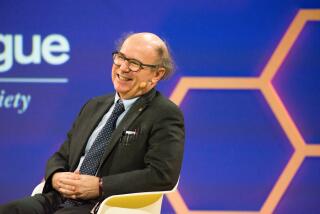Theories on faith and science
- Share via
Re “Faithful to God, Science,” Column One, Aug. 17
Kudos to Dr. Francis Collins. I’ve never understood why my evangelical friends cannot fathom that an all-powerful God can create the universe and also create the process of evolution. Do they wish to put limits on her capabilities?
RICHARD W. NAGLE
Hollywood
*
Science is that small branch of general philosophy that takes verifiability as its truth table. It is orthogonal, and has nothing to do with religion, ethics, aesthetics, metaphysics, etc. It may present views on religious myths, like whether the raven or Prometheus brought the sun to Earth, whether the universe rests on the back of a turtle, whether the Earth is 5,700 years old, whether a flood covered the Earth, etc. But it is completely silent on whether there is or is not a God, whether the weak or strong should conquer the Earth, whether a particular object is beautiful or not. It can with some certainty estimate the consequence of an action or a belief, but until someone can devise a test for an all-powerful God, or aesthetics or ethics or metaphysics, people can believe these aspects as they wish, for science has nothing to do with them.
ARTHUR YUWILER
Woodland Hills
*
Thank you for the thought-provoking article about Collins. I am a physics teacher, and students sometimes ask questions seeking to reconcile science with their faith. I tell them that the two are not mutually exclusive. God may have caused the Big Bang to occur, and he or she may be the author of the laws of physics that control our universe.
In my opinion, one cannot be a scientist and deny the possibility of God’s existence. There is no empirical, testable evidence in that direction either.
KIM MONSON
San Pedro
More to Read
Sign up for Essential California
The most important California stories and recommendations in your inbox every morning.
You may occasionally receive promotional content from the Los Angeles Times.











